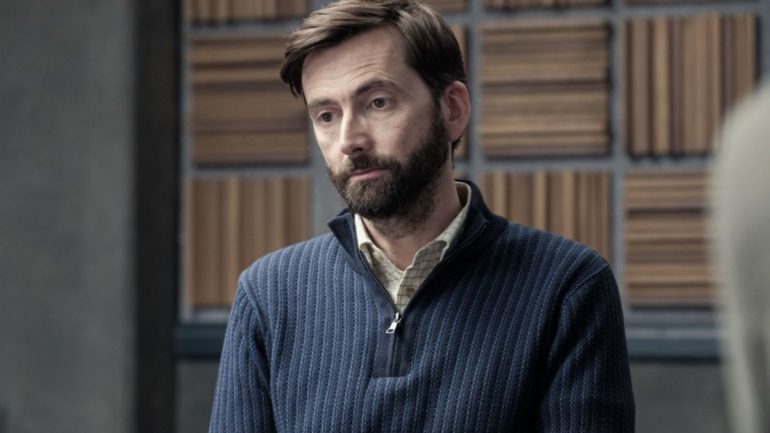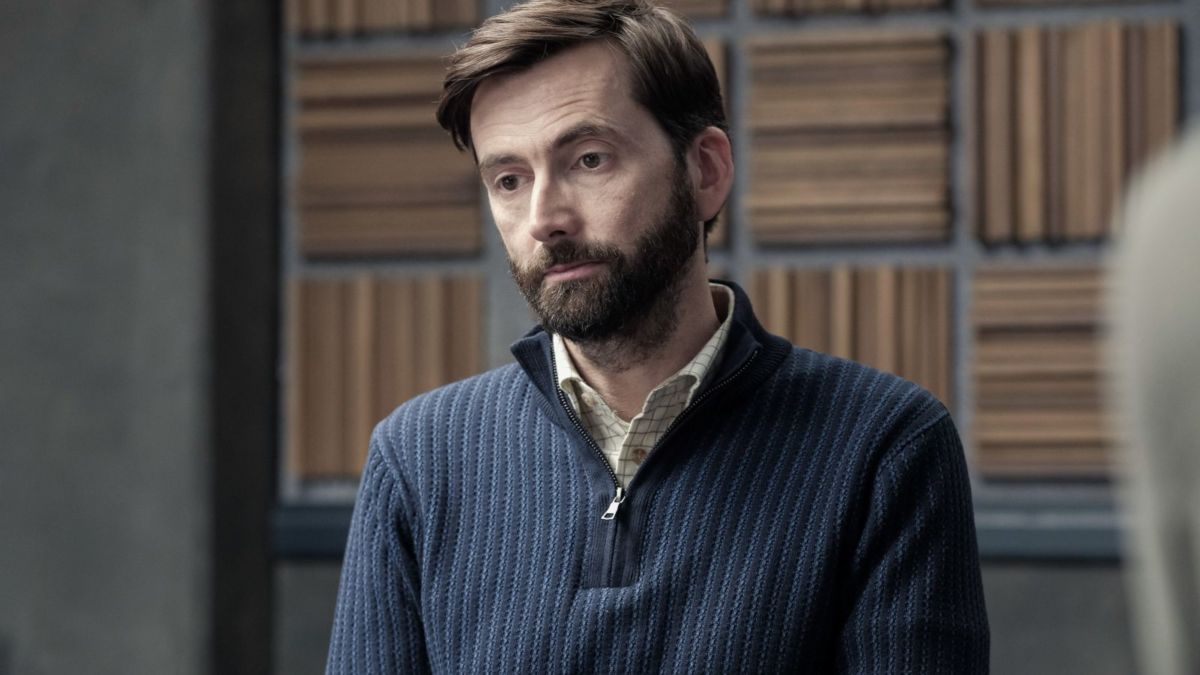Set within the confines of an interview room, Criminal focuses on the methods and techniques detectives employ in order to catch out their suspects. This collection of twelve episodes has been split up into four seasons, each one taking place in a different country. Criminal: United Kingdom contains three forty-five minute episodes, offering some strong storytelling and great British talent.
To set a series almost entirely in an interview room is a risky move as there is a danger that the material used won’t be stimulating enough. Criminal: United Kingdom doesn’t suffer that problem and is a highly engaging and interesting watch, with clever writing and impressive performances.
The cast and crew’s ability to produce investing and gripping drama shows just how effectively a story can be told in one location. I was heavily reminded of films such as Locke and The Room where a single setting is used to its full potential. If anything the interview room and building the show is set in feel like a character itself. It has a presence that reinforces the intensity and tension of the drama taking place inside of it.
The first episode focuses on Dr. Edgar Fallon (David Tennant) who is accused of the murder of his stepdaughter. Being entirely honest, I was a little apprehensive of the choice of casting. Tennant can be good in certain roles, but he can also be incredibly over the top and irritating in others. Case in point being his performance as Barty Crouch Jr. in Harry Potter And The Goblet Of Fire, where he had a strange acting technique of licking his lips every five minutes, presumably to indicate his character was weaselly and evil. Instead it just ended up being incredibly silly to watch.
Fortunately, Tennant gives a very strong performance in Criminal: United Kingdom. He plays Fallon subtly and understated, and when his character does show a bit of anger and emotion it feels genuine and not exaggerated.
There is an intensity and tension to the whole episode, as the detectives use a number of different approaches to try and trip up Fallon. The pressure is further applied when it is factored in that they are working against the clock. This adds a real sense of urgency to the interview and that is exhibited well through all the characters involved.
Although much of the episode takes place in the interview room, there is also a fair amount of focus on what is going on behind the one way mirror. This is where viewers get a real insight into the team who are working to crack the case. Each episode has a different suspect but the core investigating team remain the same. That allows for a good development of the characters, as well as the relationships they have with one another.
This is helped by good performances all round and the combination of effective character writing and a well chosen cast make for an investing watch. Lee Ingleby stands out in particular because he is a very gifted actor and always a really strong screen presence.
The dynamic of the team is also nicely done. It isn’t focused on too much that it detracts attention from the main interviews, but there is enough focus given that it feels substantial. Throughout the three episodes we see problems develop within the team. These moments of confrontation simultaneously flesh out the characters and reinforce the stress and tension of the episodes.
There is a great pacing to the programme. When we are first introduced to Fallon in the opening episode, he keeps mostly quiet and answers every question with no comment. This poker face attitude makes it tricky for the team and the viewer at home to gauge whether he is guilty or innocent.
As the episode develops though we see cracks start to appear, as his alibi is challenged. Tennant is convincing in his role as Fallon and when he does eventually open up and start talking, the change doesn’t feel jarring or sudden. Both the writing and acting is sly enough to cause a level of doubt, and that is the sign of a good crime drama.
The second episode of Criminal: United Kingdom focuses on Stacey Dooley (Hayley Atwell), who is under suspicion of poisoning her sister’s boyfriend. This is the best of the three episodes and a lot of that boils down to Atwell’s central performance. She has really thrown herself into the role, fully inhabiting the character she portrays.
It is a very different type of role for Atwell as she usually plays very likeable characters with strong moral compasses, such as her role as Agent Carter in the Marvel Cinematic Universe. She also more often than not plays quite elegant characters with a level of grace and poise. But in Criminal: United Kingdom, Atwell presents a character who is brash, unfiltered and with a very dubious moral code. A number of approaches she takes make for a convincing performance, from the way she plays with her hair to how she sits in her chair. These little nuances and details add that extra layer of authenticity to the character.
This episode also does a really solid job of challenging both the team’s and the viewer’s preconceptions about Stacey. At first she comes across as quite confrontational, blunt and a bit of a waster. But as the interview progresses we see a more sensitive and caring side to her.
But it isn’t a straightforward switch from one to the other. Stacey constantly fluctuates between being likeable one moment to dislikeable the next. It shows a complexity to her character and also highlights how contradictory humans are. Atwell succinctly presents the hybrid nature of her character, which reinforces the intense drama of the episode.
What is impressive about Criminal: United Kingdom is how each interview has its own unique tone and feel. The characters and mini-narratives of the team carry across, but the interviews themselves are completely individual. This is both in terms of writing and acting. With the stories it makes them different enough to not suffer being repetitive. But what it also does is serve for an appropriate level of mystery and surprise.
Although I guessed the twist halfway through the second episode, it was still satisfying that they hadn’t simply replicated the formulae of the first episode. In regards to acting, all three actors bring their own approach to the table. For me there was something particularly resonant about Atwell’s performance, but the others were also very impacting.
A lot of the impact comes from the fact that you can’t help but sympathize with all three suspects. In fact the series deliberately plays around with your emotions. All three of them come across as quite dislikable at the start of each interview. But as the episodes develop you can’t help but feel sympathy for them. When they behave more vulnerable it causes a moral quandary that challenges both the team and the audience.
In some cases it isn’t that their actions are justified but more that you can understand why they have done it. This blurring of moral lines is also applied to the investigating team and there are a handful of moments where the show explores doing the wrong thing for the right reason. In the third episode where they are interviewing suspect Jay Muthassin (Youssef Kerkour) this becomes even more prevalent.
Not only does it apply to Jay, but also to one of the members of the team. Kerkour does a brilliant job of presenting a character that is caught in a compromising position and facing a moral struggle. That makes the viewer’s relationship with him extremely complicated, and it is clever how the show is about challenging both morality and perception.
All of the episodes of Criminal: United Kingdom are intense to sit through but the third one makes for a particularly stressful watch. This is because they are once again racing against the clock. Only this time it is in order to save lives. The others are tense in the regard that they are trying to nail the suspect in time. But with episode three, there is the added element that they are faced with an ongoing live issue. There is an underlying tone of urgency which really ramps up the tension.
For the suspect Jay you can see the internal struggle and dilemma he faces, and the impact of the detective’s continual pressure as they try desperately to get the answers they are looking for. All the characters are pushed to breaking point and the gravity of the situation is conveyed really well, right the way through the episode.
Despite each episode being different in terms of suspect and case, there is a certain level of consistency and continuity to Criminal: United Kingdom. As previously mentioned, there are the returning core characters of the team, which carries over certain mini-narratives – but it is also consistent in terms of style and tone. Having it all take place in the same location gives the show a sense of familiarity. Both the interview room and the observation room on the other side of the glass are instantly recognizable after the first episode.
There are also visual similarities. Many of the shots and angles are replicated. The scenes within the interview room use a great deal of close ups. This is obviously needed to unflinchingly show the reactions of the suspects. But it also shows the signature style of cinematographer Jamie Carney.
It’s also a nice little touch that at the end of each episode the camera pulls away from the one way mirror into a wide shot. These various creative decisions allow the show to feel like a part of a bigger whole, even though there are individual touches to each episode.
There are a handful of aspects that don’t quite work well. Although the suspects themselves are authentic and highly convincing, the same isn’t entirely true about the investigating team. A couple of them feel a little too much like cop caricatures. Certain character traits just seem a bit larger than life.
One character arc, although interesting and well acted, seems particularly far-fetched. Without wanting to give too much away, it revolves around one of the detectives being allowed to continue conducting his interview, despite clearly not being in any fit state to do so. For a realistic crime drama, it seems out of place as it would be very unlikely that it would be allowed to play out. This is a shame, because for the most part the team feel like down-to-earth and believable characters.
There’s also something not quite right about the ending of the third episode. The pacing throughout is brilliant, excellently building up tension and stress. But the closing sequence of the third episode doesn’t flow to a natural conclusion. It could be to deliberately show how there are always loose ends, even after getting the necessary result. But something about it doesn’t quite gel like the previous two episodes.
However, these minor elements aren’t enough to take away from what Criminal: United Kingdom does get right. The decision to set nearly all of the programme in one interview room pays off with some absorbing interactions and exchanges between characters either side of the table.
The individual cases are interesting with enough mystery included, and the characters are engaging and well developed. The occasional glimpses into the lives of the various members of the teams adds an extra element of intrigue, and the dynamics of their relationship are well examined.
Some of the coverage you find on Cultured Vultures contains affiliate links, which provide us with small commissions based on purchases made from visiting our site. We cover gaming news, movie reviews, wrestling and much more.




